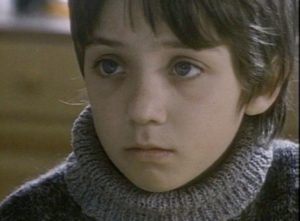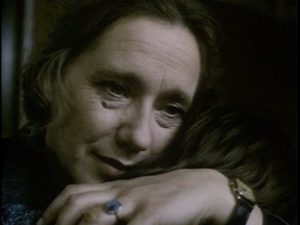Decalogue I (1989). Written by Krzysztof Kieslowski and Krzysztof Piesiewicz. Directed by Kryszstof Kieslowski. Cinematography by Wieslaw Zdort. Music by Zbigniew Preisner. Starring Henryk Baranowski , Maja Komorowska, and Wojciech Klata. Facets Edition. Rating: G, 56 mins. Rotten Tomatoes: 100%.
How to know God, if there is a God? This is the question that in some way or another hearkens back, for better or worse, to the wellspring of just about every earthly culture. God somehow shows up all over and without a smidge of proof, or such is our “informed” modern judgment. Is it just hunch or hope, that twitch of wishful thinking, a liturgicalized whistle in the dark?
That question is central and pointed in Kieslowski’s Decalogue I, a brief story that pointedly confronts the new belief and the new scientism, meaning hard-nosed scientific naturalism wherein, with very few exceptions, nary a twitch of thought or sentiment is wasted on ancient wives tales and ghost stories. Here a kindly and deeply caring father (Henryk Baranowski) dotingly tends to young son Pawel (Wojciech Klata), especially since the boy’s mother is working elsewhere. The boy’s curiosity about death mounts after seeing the body of a neighborhood stray dog. Father Krzysztof explains that in death things just stop working, like a broken machine, and well, that’s it. Whether that will pass muster for the boy, we do not find out. The real test is whether the father can handle his own nonchalant skepticism. And for this screenwriters Kieslowski and Piesiewicz have come up with the perfect drama, albeit grim, and horribly common, to press the father’s skepticism. Alas, does a creature (and soul?) so beautiful and sweet and smart as Pawel just vanish, obliterated, soon-to-be dust?

There is a rejoinder of sorts from Pawel’s Aunt Irena (Maja Komorowska), a devout Catholic who asks his father’s permission to have Pawel attend religious instruction, to which the father has no objection. Her own sense of divine reality and immediate, palpable presence is deeply informed by wonder at the splendor of the human creature and the immense, fathomless pleasure it affords those mindful of its miraculous reality, though she does not use that word. This amounts to a natural theology of sorts that Aunt Irena deems divine reality palpable in two inescapable dimensions. The first is life itself: “one is alive, and it’s a present. A gift.” On this as an obvious and frequent domain of human experience, see Christian Wiman’s collection of far-flung poetry, Joy: 100 Poems (Yale UP, 2018). And the second is the current of love that courses through human experience, something that lies beyond explanation and measurement. This second manifestation of God comes in the subjective apprehension of what cannot be measured, and this she explains to Pavel that by asking him what he feels as she hugs and holds him. That is, put simply, the improbable but ever-pressing reality of love: “I love you.” “Exactly: that’s where he is,” says Irena.

The rationale is markedly devoid of any reference to any doctrine related to biblical revelation, though it is there front and center in the biblical ground of being. It is the assumption, the radical first word of Scripture as Adam upon awakening from his rib removal spies Eve and instantaneously proclaims to his Creator, “Now this at last, Flesh of my Flesh, bone of my bones, this is the reason a man leaves his parents” (my italics). As the oft-recorded rock song had it, “Just One Look.”
Sign Up for Our Newsletter!
Insights on preaching and sermon ideas, straight to your inbox. Delivered Weekly!
Categorized into God, Life
Decalogue 1 (1989)